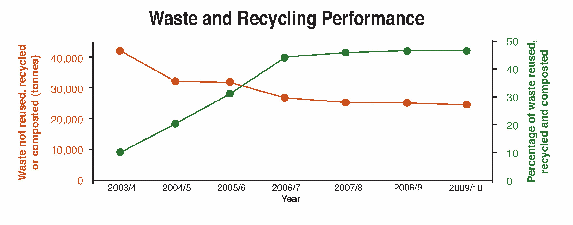Recycling
The average household in the UK produces more then a tonne of waste every year, this comes to a total of 31 million tonnes per year. A lot of this waste is not in fact completely useless. Glass bottles only need to be washed before they can be reused (in the UK reusing glass bottle used to be normal, with each returned bottle worth a few pence). It takes a lot of energy to produce for example, a bottle or steel can and even more to produce an aluminium can. If the glass bottle is recycled this energy does not need to be used. If the steel or aluminium can is recycled, energy is saved because it takes a lot less energy to recycle a used can than to produce a new one.
Aluminium recycling requires only 5% of the energy and produces only 5% of the carbon dioxide emissions compared to making a can from scratch. One recycled aluminium can saves enough energy to run a television for three hours! Large savings in energy and effort are produced by recycling paper, glass, steel, plastic and many more materials. In addition to this, many materials will not degrade organically or are poisonous to wildlife. Plastic bags – a prime target for recycling - may not properly degrade for hundreds of years. Distressing stories have been published of animals unable to digest food because of plastic bags that have clogged their intestines.
Councils in the UK make it possible and even require households to sort their rubbish into different types – plastic, glass, aluminium and steel, paper - for recycling. The rubbish to collected weekly by recycling trucks. In addition, councils have recycling depots where a large number of items – furniture, electrical items, wood and metal – can be taken. Many of these display re - usable items and people are free to take them away.
Many charity organisations will now take away your unwanted goods free and clean or repair them for reuse. If they cannot be used, they will be properly recycled. There are also networks of people – many organised over the internet, such as freecycle – who recycle items among themselves as a cooperative venture.
All of these efforts to reduced the amount of waste put into landfill sites are having a real effect. Some local councils now ensure that half of household waste is recycled. This is illustrated for a typical council – Staffordshire – below.
